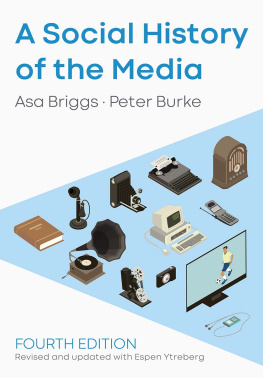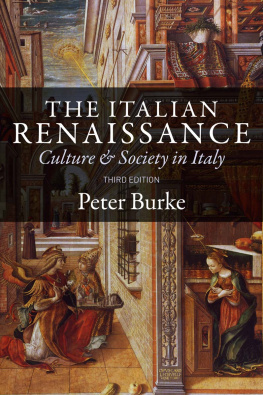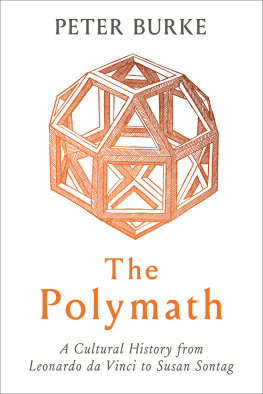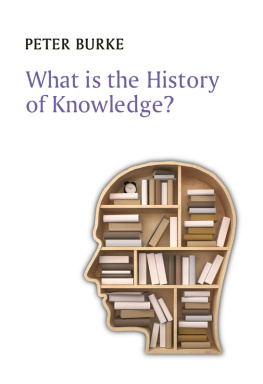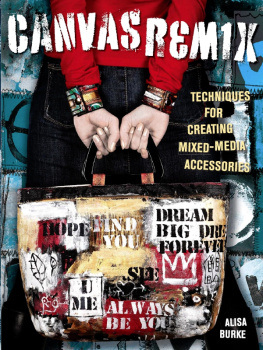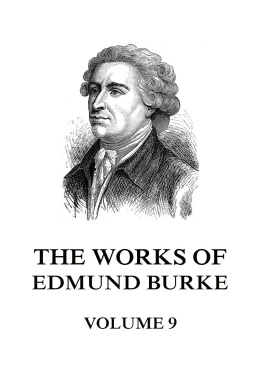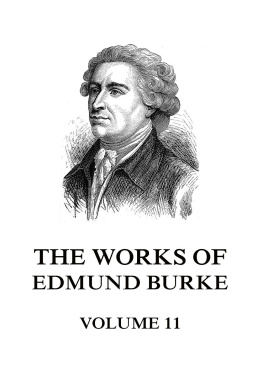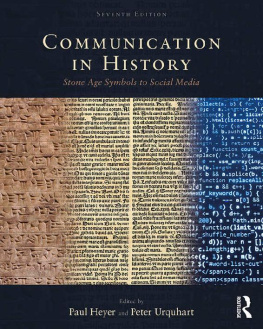Peter Burke - A Social History of the Media
Here you can read online Peter Burke - A Social History of the Media full text of the book (entire story) in english for free. Download pdf and epub, get meaning, cover and reviews about this ebook. year: 2020, genre: Religion. Description of the work, (preface) as well as reviews are available. Best literature library LitArk.com created for fans of good reading and offers a wide selection of genres:
Romance novel
Science fiction
Adventure
Detective
Science
History
Home and family
Prose
Art
Politics
Computer
Non-fiction
Religion
Business
Children
Humor
Choose a favorite category and find really read worthwhile books. Enjoy immersion in the world of imagination, feel the emotions of the characters or learn something new for yourself, make an fascinating discovery.
- Book:A Social History of the Media
- Author:
- Genre:
- Year:2020
- Rating:5 / 5
- Favourites:Add to favourites
- Your mark:
- 100
- 1
- 2
- 3
- 4
- 5
A Social History of the Media: summary, description and annotation
We offer to read an annotation, description, summary or preface (depends on what the author of the book "A Social History of the Media" wrote himself). If you haven't found the necessary information about the book — write in the comments, we will try to find it.
A Social History of the Media — read online for free the complete book (whole text) full work
Below is the text of the book, divided by pages. System saving the place of the last page read, allows you to conveniently read the book "A Social History of the Media" online for free, without having to search again every time where you left off. Put a bookmark, and you can go to the page where you finished reading at any time.
Font size:
Interval:
Bookmark:

Fourth Edition
Asa Briggs and Peter Burke
with Espen Ytreberg
polity
Copyright Asa Briggs and Peter Burke 2020
The right of Asa Briggs and Peter Burke to be identified as Authors of this Work has been asserted in accordance with the UK Copyright, Designs and Patents Act 1988.
First published in 2001 by Polity Press
This edition published in 2020 by Polity Press
Polity Press
65 Bridge Street
Cambridge CB2 1UR, UK
Polity Press
101 Station Landing
Suite 300
Medford, MA 02155, USA
All rights reserved. Except for the quotation of short passages for the purpose of criticism and review, no part of this publication may be reproduced, stored in a retrieval system or transmitted, in any form or by any means, electronic, mechanical, photocopying, recording or otherwise, without the prior permission of the publisher.
ISBN-13: 978-1-5095-3374-9
A catalogue record for this book is available from the British Library.
Library of Congress Cataloging-in-Publication Data
Names: Briggs, Asa, 1921-2016, author. | Burke, Peter, 1937- author. | Ytreberg, Espen, 1964- author.
Title: A social history of the media : from Gutenberg to Facebook / Asa Briggs, Peter Burke, Espen Ytreberg.
Description: Fourth edition. | Medford : Polity, 2020. | Includes bibliographical references and index. | Summary: The classic text for historians and media scholars, updated throughout and with a new chapter on social media and big data-- Provided by publisher.
Identifiers: LCCN 2019040330 (print) | LCCN 2019040331 (ebook) | ISBN 9781509533718 (hardback) | ISBN 9781509533725 (paperback) | ISBN 9781509533749 (epub)
Subjects: LCSH: Mass media--History. | Mass media--Social aspects. | Mass media--Economic aspects.
Classification: LCC P90 .B695 2020 (print) | LCC P90 (ebook) | DDC 302.2309--dc23
LC record available at https://lccn.loc.gov/2019040330
LC ebook record available at https://lccn.loc.gov/2019040331
The publisher has used its best endeavours to ensure that the URLs for external websites referred to in this book are correct and active at the time of going to press. However, the publisher has no responsibility for the websites and can make no guarantee that a site will remain live or that the content is or will remain appropriate.
Every effort has been made to trace all copyright holders, but if any have been overlooked the publisher will be pleased to include any necessary credits in any subsequent reprint or edition.
For further information on Polity, visit our website: politybooks.com
The aim of this book on a vast and ever-expanding theme has been to show the relevance of the past to the present by bringing history into media studies and the media into history. Our own choice of medium reflects a qualified optimism in the future of the book, which we believe will continue to exist alongside newer forms of communication as manuscripts did in the age of print. There will, however, be a new division of labour between media, which is already apparent.
So far as our own division of labour is concerned, in earlier editions, Peter Burke was primarily responsible for , joined forces both to write and to revise the text, meeting regularly in different locales, from Kings Cross Station to Claridges, as well as keeping in touch by telephone. Historians of the twenty-first century may like to note that the text was originally written partly in longhand and partly on a personal computer by two academics whose resistance to driving cars and using email is in no way incompatible with an interest in technological and social change in the present and the future as well as in the past.
We should like to thank Amleto Lorenzini for first yoking us together in a project on the history of communication, and John Thompson for commissioning the volume. We are indebted to Pat Spencer for her help in getting the first three editions into the hands of the printers, while Peter Burke is grateful to Joad Raymond for his comments on a draft of .
There are significant differences between all editions of this book. This fourth edition, revised after the death of the senior author, Asa Briggs, replaces his with a major new chapter on twenty-first-century media developments by Espen Ytreberg, who has also comprehensively revised the introduction together with Peter Burke. Subheadings have been introduced to make this a more reader-friendly volume and the chronology has been updated. The ever-expanding bibliography has been replaced by recommendations for further reading, while Asas chapters have been reduced in length. We hope that our craft is now ready to sail or fly into the third decade of the twenty-first century.
Introduction
Although the phrase the media only came into use in English in the 1920s, a concern with the means of communication is very much older. Rhetoric, the art of oral and written communication, was taken very seriously in ancient Greece and Rome. It was studied in the Middle Ages and the Renaissance and it was still taken seriously in the eighteenth and nineteenth centuries.
The concept public opinion appeared in the late eighteenth century, together with the idea of political propaganda, which emerged during the French Revolution. A concern with the so-called masses can be traced from the early nineteenth century onwards, at a time when daily newspapers were helping to shape national consciousness by making people aware of their fellow readers, viewing the same items of news at more or less the same moment.
Journalism became an academic subject early in the twentieth century. The first school of journalism in the USA was founded in 1908, at the University of Missouri, and the first in Germany (the Institut fr Zeitungswissenschaften) was founded in Leipzig in 1915. With the rise of radio and television, universities established departments of communication (or communications). For example, the Annenberg School of Communications (now Communication in the singular) was established at the University of Pennsylvania in 1958.
More recently, some ambitious theorists, from the French anthropologist Claude Lvi-Strauss (19082009) to the German sociologist Niklas Luhmann (192798), have extended the concept of communication still more widely. Lvi-Strauss wrote about the exchange of goods and women, Luhmann about power, money and love as so many media of communication. Readers may already be asking themselves, what does not count as communication? This history will deal primarily with the spread of information, ideas and forms of entertainment in words and images by means of speech, travel, writing, music, print, telegraphy and telephony, radio, television and, most recently, digital, social, mobile and locative media (a term that we shall be using in the plural to refer to these different means of communication).
This introductory chapter first introduces the deeper history of communication preceding these media, before discussing orality, literacy and secondary orality as an overarching set of concepts for synthesizing communication history. It then explains how a wider definition of the medium concept has been used in more recent media-historical work. This chapter contains an up-to-date review of theoretical work on media history, while later chapters concentrate chronologically on the real-historical developments of media in society.
Significantly, it was in the age of radio that scholars began to recognize the importance of oral communication in ancient Greece and in the European Middle Ages, as well as in Africa and elsewhere. The First World War and the rise of communism and fascism encouraged the study of propaganda, neatly defined by the American journalist Walter Lippmann (18891974) as the manufacture of consent. A classic study by another American, the political scientist Harold Lasswell (190278) bore the title
Next pageFont size:
Interval:
Bookmark:
Similar books «A Social History of the Media»
Look at similar books to A Social History of the Media. We have selected literature similar in name and meaning in the hope of providing readers with more options to find new, interesting, not yet read works.
Discussion, reviews of the book A Social History of the Media and just readers' own opinions. Leave your comments, write what you think about the work, its meaning or the main characters. Specify what exactly you liked and what you didn't like, and why you think so.

